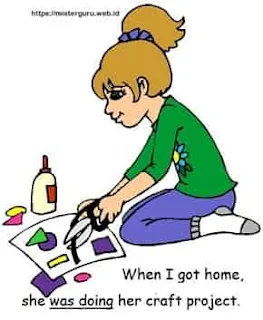Have you ever tried describing a scene from the past, like what someone was doing at a specific moment or how events unfolded simultaneously? That’s when you need to use the past continuous tense! This tense is used to describe ongoing actions in the past. In narrating or telling a captivating story, sharing an unforgettable experience, or explaining why something happened, the past continuous can add depth and clarity to your communication. Let’s dive in and explore how to use this tense effectively!
A. The Structure of Past Continuous Tense
Positive Sentence
Subject + Was/Were + Present Participle (Verb-ing)
- The student was learning English structure.
- Some workers were repairing the road.
- Fani and her sister were walking along the beach.
Question / Interrogative Sentence
Was/Were + Subject + Present Participle (Verb-ing)
- Was the student learning English structure?
- Were they repairing the road?
- Were Fani and her sister walking along the beach?
Negative Sentences
Subject + Was/Were + Not + Present Participle (Verb-ing)
- The student wasn't learning English structure.
- Some workers were not repairing the road.
- Fani and her sister weren't walking along the beach.
B. How to Use Past Continuous Tense
- Past continuous tense is used to talk about what was happening at a particular time in the past.Compare the two sentences below. They refer to different situations:
- What were you doing yesterday at seven p.m.?
- When she entered the room, the students were doing the assignment.
- When the guest arrived, we were still preparing dinner.
- When the guest arrived, we prepared dinner.
-
In narratives (stories, etc.), the past continuous is often used for descriptions, and the past simple for events and actions.The waiter was setting the table with fine china and crystal glasses. Just as he was placing the last plate, someone bumped into him, and the plate fell to the floor.
- The past continuous is used for temporary actions and situations in the past. For longer or more permanent situations, we usually use the past simple.The earthquake happened while I was living in Bantul last year.
I lived in Malang for ten years when I was a child. -
In the expressions "I was wondering if you could/would…….., I was hoping, and I was thinking", the past continuous is used to make a request or suggestion sound more polite or less definite.I was wondering if you’d like to go out with me for dinner one evening.
-
The past continuous can be used to indicate a gradually developing situation.It was getting darker.
The wind was rising. -
In indirect speech, the past continuous is used as a past equivalent of the present continuous:He said, “She is working.” He said that she was working.
- Just as in the present continuous, there are verbs that cannot be used in the past continuous.
- The students were distracted because the teacher something on the whiteboard.
- He usually cycles to work, but when I saw him yesterday, he a motorbike.
- A group of teenagers basketball, and two parents near the bleachers.
- When I entered the classroom, she something on the blackboard.
- He near the train station. I asked him what train he for.
- I walked into the backyard to see what the kids . Budi the plants, and Sari a birdhouse.
- While we through the woods, someone passed by and left this note.
- As he the steep hill, his backpack fell off and rolled down.
- I couldn’t hear him properly because the music so loudly.
- The race had just begun, and the participants their shoelaces tighter.
- I dinner when the electricity off, so I cooking with a flashlight.
- When I at the seminar, the session had already begun, and the speaker a new slide.
- She suddenly that she on the wrong route.
- He loudly in the park when someone from a nearby house and a ball at him.
- From the voices inside, it was clear that the choir a new song.
- You so focused when I by yesterday. What on?
- While she to bake, she accidentally burned the cookies twice.
- To reach his village, he to cross a river where a protective swan .
- Clara didn’t order dessert because she to eat healthily.
- The swan normally people unless something its nest.
- Unfortunately, as he across the river, his phone suddenly ringing.
- While she the wall, it to drizzle. She a raincoat and painting.
- I an old coin while I a hole for planting flowers.
- When I first spoke to him, he for his coffee at the café.
- When they at the airport, their guide for them. As soon as they him, they excitedly.
- The workers that they the road near my building and that they extra tools.

C. Exercise Section
A. Do this exercise. Put the verbs into the past continuous tense.Review the differences between the Simple Past and the Past Continuous HERE.
Updated: Feb 22, 2025BSESMK X 053111 0324PM 7081



saya ketemu disini www.bse.mahoni.com buku kurikulum 2013 paling komplit (lebih komplit dari kemdikbud) dan ada juga aplikasi untuk baca di HP sangat berguna.
ReplyDelete